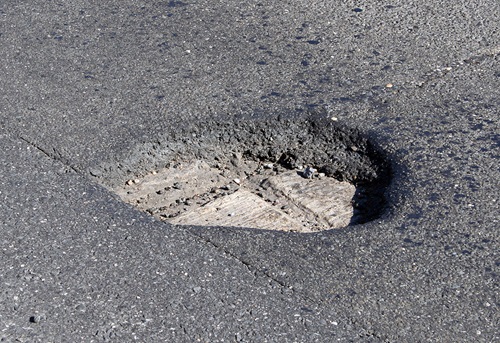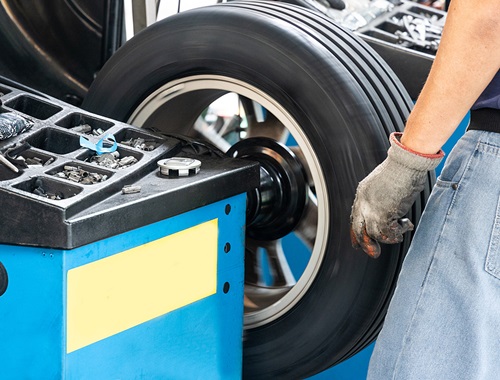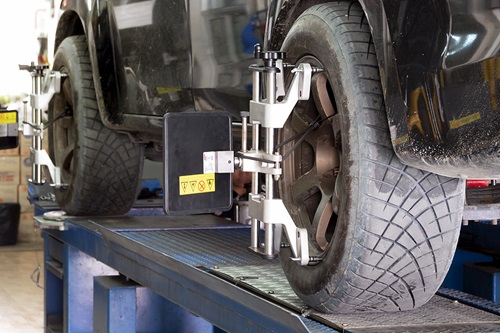Does your car’s steering wheel vibrate while you’re driving? Do your arms feel tired after a long drive? Are your tyres wearing faster than they should? Your wheels probably need to be balanced. But what is tyre balancing?
When you consider the tough job that your car’s wheels and tyres have to do, every day, you can see it’s important to ensure that they are in the best possible condition for the job in hand.

Potholes, speed humps and broken, uneven road surfaces do plenty to upset your car’s wheels, tyres and suspension. And if those wheels aren’t balanced properly, they can’t give you 100% performance.
Having correctly balanced wheels is just as important as having the correct and legal tread on your tyres. Tyres are, after all, the only components that make direct contact with the road so ensuring that they are safe and fit for use is vital for you, your passengers and other road users.
How does tyre balancing work?
Tyre balancing, also known as wheel balancing, ensures that the weight of each wheel on your car is evenly balanced on their axles.
If something is out of equilibrium the wheel won’t be making perfect contact with the road, all the time, all around its circumference. And if some areas of the tyre’s tread are not making correct contact with the tarmac it can lead to uneven wear of the rubber. That can also encourage premature wear of other car components such as the steering rack and suspension.

More than that though, unbalanced wheels can become uncomfortable for the driver, with a constant vibration through the steering wheel at speed, and could even pose a safety risk in more severe cases. Properly aligned and balanced tyres are safer and help to return the best fuel economy for your car.
To ensure that the wheels and tyres are rotating evenly, specialist technicians can check and adjust the wheel by adding small weights to its rim, to counterbalance it.
The wheels are put separately on to a special balancing machine and rotated at speed while the machinery detects weight discrepancies and pinpoints their position. It also tells the technician how much weight should be added as a counterbalance.
When should tyre balancing be done?
It only takes tiny amount of imbalance to upset a tyre’s performance. The wheel rim might have small dent in it, a different tyre valve which weighs slightly more might have been fitted to a wheel or perhaps the tyre, while made uniformly, could have a slightly more dense or heavier area than in other parts. Therefore, tyre balancing is important.
It can be done as part of your car’s regular service schedule and, of course, you can also request a balancing check at any time. Every 6,000 miles or once a year for a check, are good guides – more if you regularly travel over rough roads. And if you have hit a particularly large pothole, which you think might have damaged a wheel or tyre, get them checked as soon as possible.
All four tyres should be checked at the same time to optimise the performance of the tyres on all corners of the car. So, if you are having one tyre repaired or changed, have all four tested for balance.
The technician will also check for bulges, cuts or gouges in the tyres while they’re off the car – these can affect performance – and they’ll advise if a new tyre is needed.
What’s the cost?
Wheel balancing costs will vary according to supplier, but look to pay between £7 and £10 per wheel. If you’re buying brand new rubber for your car, you should expect any balancing to be done free of charge by the fitter.
What about wheel alignment?
This is just as important as wheel balancing but the two can sometimes be confused. While balancing sorts out the weight distribution around the tyre, alignment looks at the position of the wheels in relation to how they are pointing on the road.

Having them looking dead straight ahead rather than slightly inwards or outwards (known as ‘toe in’ or ‘toe out’) improves tyre performance and cuts down on unwanted premature wear and cost.
While alignment is not a compulsory requirement, if you are having your tyres balanced you might as well have the alignment checked too.
Safety check
MotorCheck’s vehicle history checking service won’t tell you how often a car’s tyres have been replaced or its wheels balanced, but it does look at other important safety areas, such correct MOT testing, a car’s true mileage, if it has previously been written off, and whether there are any outstanding vehicle safety recalls that have been left unaddressed.
So just like the wheels, MotorCheck’s £9.99 single vehicle check could help you come to a more ‘balanced’ view on whether to buy that next used car or not.
